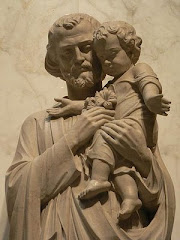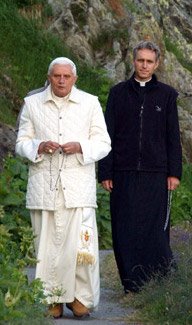Prior General of the Order of the Brothers
of the Blessed Virgin Mary of Mount Carmel (O.Carm.)
&
Prepositus General of the Order of the Discalced Brothers
of the Blessed Virgin Mary of Mount Carmel (O.C.D.)
Christ is the way; Mary reflects the way; her Scapular is our keepsake on the way.
There is no one who is not aware how greatly a love for the Blessed Virgin, Mother of God, contributes to the enlivening of the Catholic faith and to the raising of the moral standard. These effects are especially secured by means of those devotions which, more than others, are seen to enlighten the mind with celestial doctrine and to excite souls to the practise of the Christian life. In the first rank of the most favoured of those devotions, that of the Holy Carmelite Scapular must be placed — a devotion which, adapted to the minds of all by its very simplicity, has become so universally widespread among the faithful and has produced so many and such salutary fruits.
Therefore it has pleased Us greatly to learn of the decision of our Carmelite Brethren both Calced and Discalced; namely, to take all pains to pay homage to the Blessed Virgin Mary in as solemn a manner as possible on the occasion of the Seventh Centenary of the Institution of the Scapular of Our Lady of Mount Carmel. Prompted therefore by Our constant love for the tender Mother of God and mindful also of Our own enrolment from boyhood in the Confraternity of this same Scapular, most willingly do We commend so pious an undertaking and We are certain that upon it will fall an abundance of divine blessings. For not with a light or passing matter are We here concerned, but with the obtaining of eternal life itself which is the substance of that Promise of the Most Blessed Virgin that has been handed down to us. We are concerned, namely, with that which is of supreme importance to all and with the manner of achieving it safely. For the Holy Scapular, which may be called the Habit or Garment of Mary, is a Sign and a Pledge of the protection of the Mother of God. But not for this reason, however, may they who wear the Scapular think that they can gain eternal salvation while remaining slothful and negligent of spirit, for the Apostle warns us: “In fear and trembling shall you work out your salvation.” —Phil. 2:12.
Therefore all Carmelites, whether they live in the cloisters of the First and Second Orders or are members of the Third Order Regular or Secular or of the Confraternities, belong to the same Family of Our Most Blessed Mother and are attached to it by a special bond of love. May they all see in this Keepsake of the Virgin herself a Mirror of humility and purity; may they read in the very simplicity of the Garment a concise lesson in modesty and simplicity; above all, may they behold in this same Garment, which they wear day and night, the eloquently expressive symbol of their prayers for the divine assistance; finally, may it be to them a Sign of their Consecration to the Most Sacred heart of the Immaculate Virgin, a consecration which in recent times We have so strongly recommended.
And certainly this gentle Mother will not delay to open as soon as possible, through her intercession with God, the gates of Heaven for her children who are expiating their faults in Purgatory - a trust based on that Promise known as the Sabbatine Privilege.
Now, therefore, as a pledge of the divine protection and help, and as an assurance of Our own special predilection We most lovingly impart to you, Beloved Sons, and to the whole Carmelite Order, the Apostolic Benediction.
Given In Rome At The See Of Peter
On The Eleventh Day Of February,
On The Feast Of The Apparition Of The Immaculate Virgin Mary,
In The Year 1950,
And The Eleventh Of Our Pontificate.
Pius PP XII














